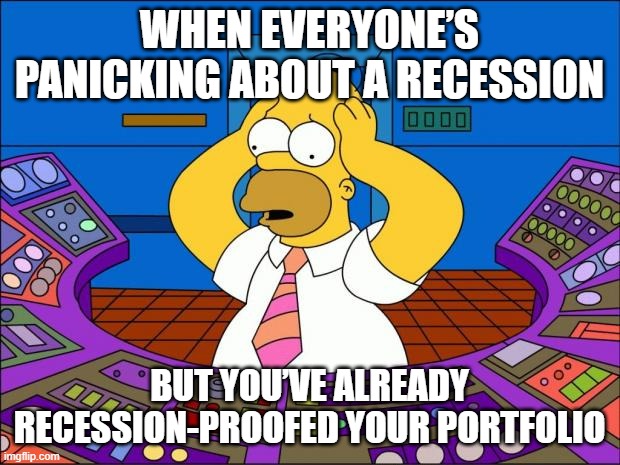Hello Grasshoppa,
With talk of a possible economic slowdown in 2024, it’s essential for all of us to recession-proof our investments. No one likes seeing their hard-earned money shrink during a downturn, so it’s better to be proactive & adjust your strategies to protect your portfolio.

1. Diversification is Key
If all your investments are tied up in one industry or market, you could face significant losses during a recession. Diversifying your assets across various industries, geographic regions, & asset classes like bonds, stocks, & real estate can help soften the blow. A balanced portfolio ensures that even if one market crashes, others may remain stable or even grow.
2. Focus on Defensive Stocks
Defensive stocks, particularly in sectors like consumer staples, healthcare, & utilities, tend to perform better in tough economic times because people still need these products & services regardless of the economy. Consider adding shares from these industries to your portfolio, as they usually offer stability & often pay dividends, providing you with passive income.
3. Strengthen Your Emergency Fund
Before diving into any major investments, ensure that your emergency fund is well-stocked. A common recommendation is to have at least 6-12 months’ worth of living expenses saved. This way, in case of a job loss or unexpected expense during a recession, you won’t need to liquidate your investments at a loss. With the lesson that we learned during the pandemic, by now we should have a certain amount of savings stocked up for any unforeseen situations.

4. Invest in Bonds or Gold
Bonds, especially government bonds, are seen as safe havens during economic uncertainty because they provide fixed returns. Meanwhile, gold has historically been a hedge against inflation & economic instability. Having a portion of your portfolio in these safe assets can provide peace of mind during turbulent times.
5. Stay the Course, Don’t Panic
One of the worst things investors can do during a recession is panic selling. Market downturns are normal, & they eventually recover. If you sell in a panic, you lock in your losses. Instead, consider staying the course or even buying more of your preferred stocks if they are significantly undervalued. Think of it as a discount sale for long-term investors! This is a similar strategy that legends like Warren Buffett use where he purchases undervalued stocks when they are on sale.
6. Dollar-Cost Averaging (DCA)
Rather than trying to time the market, DCA allows you to invest a fixed amount of money at regular intervals, regardless of the market’s performance. This strategy reduces the impact of short-term volatility & ensures that you’re buying assets at an average price over time. It’s a great way to continue growing your portfolio, even during a recession. The best way of utilizing DCA is by setting up auto-debit for some of your investments.
7. Reevaluate Your Risk Tolerance
In times of economic uncertainty, it’s vital to reassess your risk tolerance. If you’re nearing retirement or have specific financial goals, you might want to shift toward more conservative investments. On the other hand, if you’re young & can afford a longer time horizon, you might continue with a more aggressive approach. If you are investing in Robo-advisor, you may be seeing portfolio reoptimisation as & when the market changes. Over my years of investing with StashAway, they have been optimizing my investment portfolio based on different market situations.

8. Keep an Eye on Global Events
The global economy is interconnected, & what happens in major economies like the US, China, or Europe can significantly impact Malaysia. Keeping up with global trends will help you adjust your investment strategy accordingly. For example, a slowdown in China’s economy could affect Malaysia’s export sector, leading to potential market fluctuations.
Conclusion:
By taking these steps, you’ll be in a much better position to safeguard your investments & even find opportunities to grow your wealth during a recession. If you are looking for investments that require fewer studies & peace of mind, do consider Robo-advisors such as StashAway, Wahed Invest, MyTHEO, or other robo-advisors in Malaysia. All you have to do is to set up the auto-debit with the robo-advisor & wait for your money to grow in years to come.

OSS!



